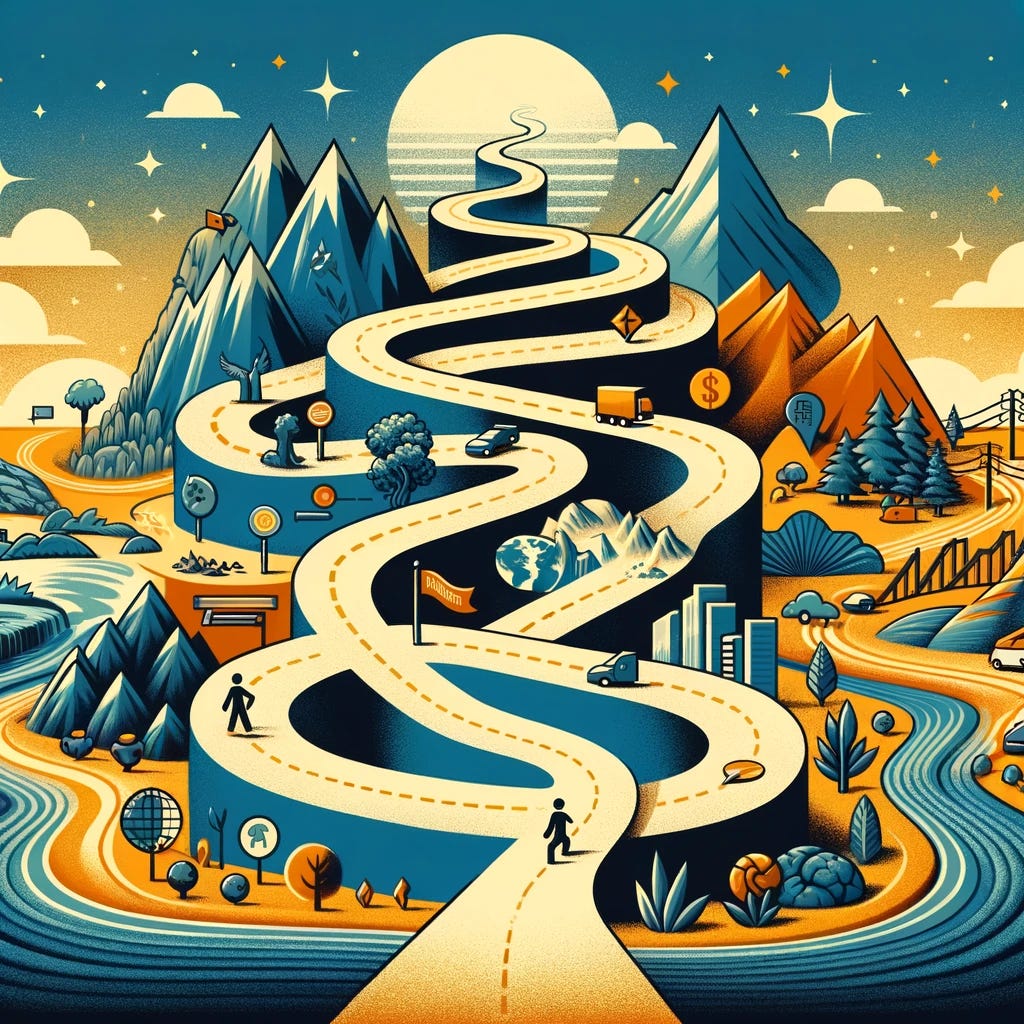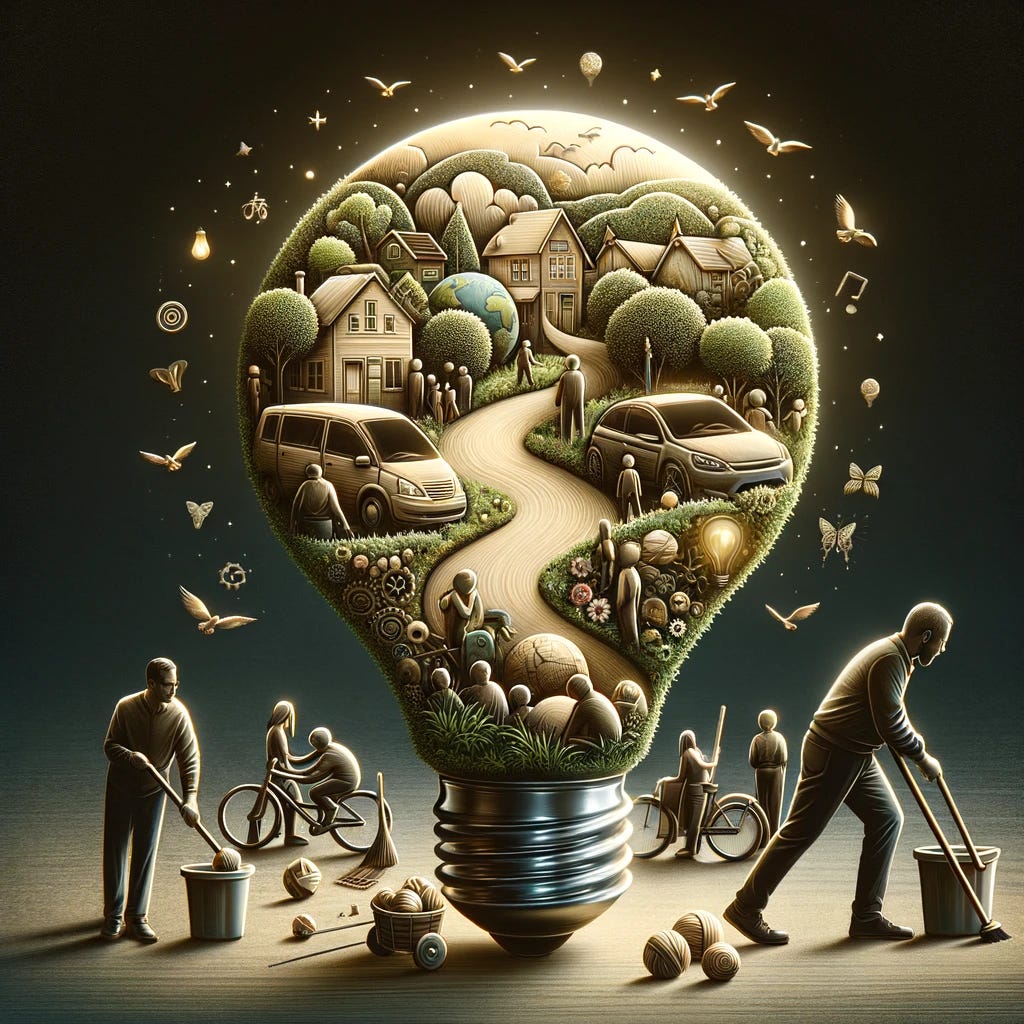Reckoning with my Millennial Tendencies
Last year, at a nondescript tech conference, I found myself in conversation with an acclaimed technologist. They were the embodiment of success, with a hefty salary, brand recognition, and a lifestyle that many would envy, all dedicated to using technology 'responsibly' for the greater good. Yet, they expressed a profound sense of lacking: a lack of 'real impact', 'power to effect change', and 'creative freedom', alongside the absence of the more illustrious accolades they'd anticipated.
This conversation gnawed at me for months afterwards, not because I found the tragic technologist and their cocktail laments unreasonable. Quite the opposite—their narrative struck a chord, revealing a discomfort all too familiar and, regrettably, relatable.
There has rarely been a more fabulous time to work in social impact….
We're living in an unprecedented era for young changemakers in technology. And it’s all thanks to the megaphones. Megaphones, or in other words, the plethora of platforms that can amplify voices and foster community organisation, signalling a democratisation of access. Alongside this, there's a burgeoning responsible tech ecosystem ripe for innovation.
Once confined to the fringes, digital rights activism has now expanded to a much broader field of responsible innovation, encompassing everything from data activism to trust and safety and responsible business practices. This shift has somewhat normalised the aspiration to 'do good' while still reaping the rewards of a tech career.
It feels like a fortuitous coincidence that my professional arc parallels that of the responsible tech movement and, broadly, the social impact sector, gathering steam with each passing year.
The choice of my master’s degree (Development Studies) meant that I was surrounded by changemakers. Some of them went on to become social entrepreneurs. Others have earned coveted White House scholarships. Some are established UN diplomats patiently plotting their way to the top. My former colleagues gave me a window into the myriad of options that constitute ‘social impact’ work.
The 'responsible AI' field, in particular, seems to attract those driven by values, ambition, and an unwillingness to compromise.
...if one can embrace its peculiarities and orthodoxies
Yet, alongside the ambitious and undaunted, I've witnessed the less glamorous side: burnout and disillusionment, especially following the latest layoffs in responsible AI and trust and safety.
The discussions I've had with those leaving the field reveal common frustrations and obstacles that could derail even the most promising careers. It seems to boil down to a mix of sky-high expectations and the modern overwhelm with the plethora of career choices and lifestyles available, compounded by the need for constant reinvention and upskilling amidst an ever-increasing array of trade-offs.
Navigating these paradoxes has been crucial for me, offering a semblance of a roadmap through the challenges of the social impact field and responsible tech space. This piece seeks to share those insights, serving both as a survival guide, and, frankly, a confessional essay.
So you want to work in social impact?
Here are a few bitters pills to swallow:
1) Stratospheric expectations
Expecting the world from our careers is a distinctly Millennial and Gen Z trait. For the impatient changemakers reading this – you are in good company.
A corporate study recently concluded that 'high expectations for business among Gen Zs and Millennials go largely unmet.' These expectations go beyond job satisfaction or career progression: the new workforce demands well-being, ethical leadership, and unwavering commitment to diversity and equity from their employers. Try sharing these aspirations with most Boomers, and they will likely fall out of their ergonomic massage chairs laughing.
At the same time, it is inspiring to witness these principles in action. Remarkably, nearly half (44% of Gen Zs and 37% of Millennials) have opted out of projects on ethical grounds, with a substantial number also stepping away from potential employers due to value misalignment.
The picture painted by these statistics is slightly grim: a large percentage of ‘younger’ office workers are likely squirming in their office chairs and craving more out of their daily grind. And sometimes, the squirming leads to great results and produces programmes such as ‘Escape the City’ and ‘On Purpose,’ facilitating career changes into social impact sectors.
However, the allure of steadfast dissent or pioneering spirit doesn't universally translate into a mass exodus from traditional roles. Many Millennials and gen Zers remain tethered to their current positions, wrestling with internal doubts. The question thus arises: Are our collective high expectations a catalyst for improvement or a recipe for perpetual discontent?
Within the discourse of hustle culture, it's typically the stories of success that capture our collective imagination and dominate media narratives. However, I've crossed paths with countless recovering hustlers embarking on delayed sabbaticals across South America or Southeast Asia, their search for a professional nirvana either ongoing or replaced by scepticism.
Most likely, they have pivoted, which neatly leads us onto the next challenge.
2) Lifestyle choices overload
I’ve said it and I’ll say it again – it’s a great time (and privilege!) to work in the social impact sector.
Broadly encompassing charities, non-profits, social enterprises, B-Corps, and VC-funded start-ups—the social impact space presents an exciting frontier for the values-driven Millennials and Gen Zers globally.
Yet, it’s the glossy images of beachside remote workers, viral TikTokers, and overnight crypto millionaires that often set the stage for our expectations, overshadowing the reality that for many, securing meaningful work that supports a dignified life remains a distant luxury.
With social impact roles typically offering less financial reward than their commercial counterparts, and entire sectors of literary criticism, academia, and journalism more broadly under threat, many find themselves exploring alternative lifestyles to fulfil their ambitions.
This exploration is often fuelled by a collective restlessness and a tendency to pivot in response to initial disenchantment. My own experiences and encounters with individuals who have chosen ‘the road less travelled ’ reveal a landscape rife with personal dilemmas and unconventional success stories.
The FIRE (Financial Independence, Retire Early) movement poses a compelling question: Is living frugally for years—or decades—worth the promise of eventual financial freedom and impact on one’s nearest and dearest? This question of balance between austerity and comfort often goes unexamined by many.
Then, there are Portfolio Careers, an appealing concept for those seeking variety in their professional lives. Yet, achieving this blend of roles is rarely straightforward, often requiring a mix of expertise, networking, and sometimes, a willingness to forgo depth in one area for breadth across several.
Social impact roles within big businesses offer the allure of financial security but tether one’s impact to the confines of corporate objectives, navigating a minefield of greenwashing and ethical compromises.
Digital nomadism presents a tantalizing option for extending the mileage of a modest social impact salary through geographical arbitrage. Ideal for those with a solid business model, it demands a high degree of discipline and may not suit every profession or personal preference.
The allure of Get-Rich-Quick schemes, fuelled by in-demand skills and insider knowledge, promises a shortcut to success without the usual trade-offs. From successful content creators to crypto traders, there always seems to be another way to have it all.
Committing to a non-traditional path can also mean sidestepping a more conventional career trajectory, possibly delaying the gratification and rewards of mastering a particular craft. As the narrative around career flexibility grows more accepting of change, the question of whether one has chosen wisely looms large.
Imagine dining at a conveyor belt sushi restaurant where the allure of a California roll fades with each pass, turning unappetizingly stale, while the next table indulges in a less ethical menu and burns their notes à la Wolf of Wall Street.
Seems exaggerated, yet sometimes, this is what a menu of modern career options can feel like—exacerbating the personal anxiety of choosing wisely and putting the onus on the individual for another attempt on the merry-go-round.
3) A relentless pressure to innovate and reinvent oneself
Within the dizzyingly fast-paced world of tech innovation, it's not unusual for individuals to show up to work only to find their job titles have changed. Have you noticed the surge in data scientists lately? Machine Learning Engineers, too, represent a relatively fresh addition to the scene.
This is especially true within the niche of responsible tech, where roles can feel as though they were invented five minutes ago. Navigating this landscape demands a cool head and strategic planning for one's career and skill development.
The need for interdisciplinary skills is especially pronounced when tackling the significant sociotechnical challenges within the spheres of trust and safety, responsible AI, and broader tech-for-impact initiatives. As such, setting out a roadmap for skill acquisition can feel like an exercise in fortune-telling.
For both STEM-leaning and humanities-leaning brains, this situation can spell a headache.
For the STEM crowd, certain realities of social impact work can pose particularly perplexing dilemmas. Data scientists aiming to tackle cutting-edge issues in the social sector, for instance, may find themselves hampered by a lack of technical resources, preventing them from expanding their skill set or engaging with the most challenging problems.
Conversely, for those less inclined towards STEM, navigating a field dominated by such disciplines presents its own set of challenges, one of the more obvious ones being impostor syndrome.
Many roles within responsible tech call for quick thinking, interdisciplinary collaboration, and a proactive stance towards career management. In sectors where the infrastructure for career progression is still under development, the importance of self-directed career development cannot be overstated.
Viewing this phenomenon as an opportunity or a nightmare will depend on one's perspective and personality type, and I believe a steady dose of self-awareness can help navigate some of these challenges. I've had conversations with young responsible AI designers who've crafted their job descriptions from scratch and talked about it with immense pride. Conversely, I've also spoken with individuals fraught with anxiety over the direction and velocity of their career shifts—a testament to the myriad ways one can pivot in this ever-changing landscape.
4) Navigating Trade-offs with Grace
The advent of Social Impact 2.0 jobs, amplified by the digital megaphones of our era, suggests that the trade-offs inherent in social impact roles might appear less daunting than they once did. Yet, let's be clear: these trade-offs are still a fact of life.
Amani Institute, established with a view to facilitating a sustainable growth of social impact solutions and careers, distinguishes between the thrivers and survivors on the changemaking marathon. Eight variables separate a thriver from a survivor.
Thrivers work from a sense of purpose and leverage intrinsic motivations, accept sacrifices in a conscious as opposed to resentful way, have a sense of autonomy in their choices, and accept what is within their control. Thrivers are also adept at deploying empathy in a mindful way, finding balance between prioritising oneself and others, deciding on an income which allows for a decent life, and setting limits on personal availability.
Parting thoughts:
Is there a better test of our values than choosing how to spend our time? And, as with most things, it's through trials and errors (multiple existential sabbaticals in Latin America, anyone?) that these values come to life.
There is a dark side to being unapologetically values-driven, marking a fast road to burnout, limited career growth, reduced financial prospects, and potentially, a lack of career freedom. Or it may catalyse a series of personal reinventions, shifts in career direction, and a discovery of a new tribe.
Personally, it's been a tumultuous decade of navigation, mainly zig-zagging between the corporate, social impact, and international development spaces.
Many of my gnarly problems turned out to be a privilege: pursuing value alignment, permission to repeatedly fail, and countless opportunities for reinvention.
I also realised that there is a real human cost to super-fast growth and, adversely, a really long time scale to achieve meaningful impact.
Most surprisingly, despite the many mathematical and philosophical frameworks available to optimise a career for social impact, I found my biggest impact came from striving to improve my immediate surrounding.
A personal note:
If you're interested in building a career in responsible tech or social impact but have been feeling slightly dismayed, I hope this essay has been helpful. If you are further along in your journey and would like to share your words of wisdom, I’d love to hear from you. If you simply feel like having a therapy session for recovering tech impact enthusiasts, drop me a line.












You nailed it with the realization that these problems are actually a privilege that previous generations could only dream of. And unfortunately even today it's still a dream in many places around the world.
Humans have this tendency to find new and innovative problems when previous ones get resolved. I'm really curious to see what future generations will come up with :)